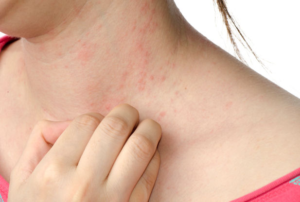What are Hives and Swelling Episodes?
What are Hives and Swelling Episodes?

Urticaria usually presents as itchy, red, and slightly raised blotches. They are commonly referred to as “welts.” The hives occur on the surface of the skin because the condition affects the superficial layers of the skin. Hives can occur in various sizes and shapes and can appear on any part of the body. Individual lesions usually last less than 24 hours, however, they may last much longer in certain instances. Hives may erupt in multiple crops of lesions in a single day as well. The condition may persist for days to months to even years in some cases. In the vast majority of cases of urticaria, (approximately 95% of the cases) no specific cause is ever identified, despite allergy testing and comprehensive laboratory testing to rule out a variety of underlying diseases that are associated with hives. In a minority of cases, sensitivity to specific foods and/or drugs are identified as the cause. Certain viral infections are also known to cause acute and/or chronic urticaria and are usually identified during the laboratory work-up.
Angioedema is a similar condition except the deeper layers of the skin are affected. The result is swelling of an area of the body, most commonly of the lips, tongue, and eyes. It is important to note that angioedema may occur on any part of the body and may even affect the throat causing a throat closing sensation or difficulty breathing which obviously can be life-threatening. The condition usually does not have associated itching. The causes of this condition are similar to the causes of hives. A rare form of this ailment is called hereditary angioedema and is caused by either the deficiency of an enzyme involved in complement pathway or a decrease in the function of this enzyme.
Treatment of urticaria and/or angioedema generally involves the use of antihistamines. Many individuals, despite the use of antihistamines, still unfortunately continue to be plagued with symptoms. In these resistant cases, it may be necessary to utilize other types of medications in combination with antihistamines in order to prevent or reduce the troubling symptoms. In recalcitrant cases, the addition of injections of biological medications [e.g., Xolair (i.e., omalizumab)] has been shown to be effective in alleviating hives in patients with chronic idiopathic urticaria. Hereditary angioedema does not respond well to antihistamines. In cases of hereditary angioedema, long term replacement via injections of the deficient enzyme may be needed on a regular basis in order to prevent symptoms. There are also various complement system blockers that can be used via injection to treat acute symptoms.
The board certified allergists at Black & Kletz Allergy have the expertise needed to diagnose and treat both adults and children who have urticaria and/or angioedema. Black & Kletz Allergy has 3 office locations in the greater Washington, DC area with offices in Washington, DC, McLean, VA (Tysons Corner, VA), and Manassas, VA. All 3 offices have on-site parking and both the Washington, DC and McLean, VA offices are Metro accessible. If you are suffering from hives, swelling episodes, and/or generalized itching, please call us to schedule an appointment. Alternatively, you may click Request an Appointment and we will respond within 24 hours by the next business day. The allergists at Black & Kletz Allergy are dedicated in providing the highest quality allergy care to the people of the greater DC area as we have done for over 5 decades.












